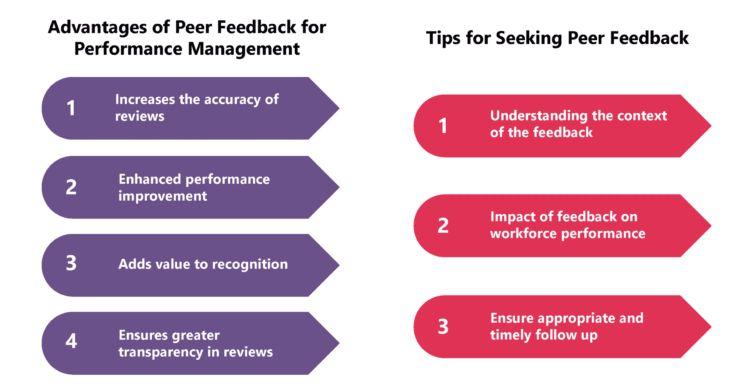1. Increased Accuracy: Peer feedback provides a more comprehensive and accurate evaluation by incorporating multiple perspectives, giving a holistic view of an employee’s performance.
2. Performance Improvement: It offers insights into work habits and areas for improvement that managers may overlook, helping employees enhance their performance.
3. Transparency and Trust: Peer feedback fosters greater transparency in performance reviews, allowing for honest input focused on employee development rather than compensation.
4. Boosts Motivation: Employees value peer feedback, which motivates them to improve and maintain their colleagues’ trust and respect.
Performance management is one of the most critical HR processes in modern organizations, as it helps keep the workforce productive and motivated. Peer feedback can help organizations provide valuable insights into evaluating their employees and driving their performance. Organizations are now realizing the importance of peer feedback for effective performance management.

It is well-known that employees have entirely different relationships with their peers than with their managers. It is mainly because employees spend much more time working with their peers, hence having a more informal and closer relationship with them.
Unlike managers, peers can observe and report the most minute details of an employee’s functioning. Hence, they are more likely to offer a less biased and more honest perspective of an employee’s performance and behavior. Involving peers is the best way to get frank 360-degree feedback about an employee’s work and performance.

Managers’ opinions on performance reviews are based solely on employee results. Peer feedback has a significant advantage because peers know the minute details of their co-workers’ working habits.
Key advantages that peer feedback offers in performance management are as follows:

Manager reviews are often off the mark based only on their viewpoint. However, since peer feedback comes from multiple people, it makes it more comprehensive and accurate.
Peer feedback combines the views and opinions from various sources to provide a bigger, more holistic picture of an employee’s performance for a more accurate evaluation.

Since manager reviews are based heavily on outcomes, they often skip the ‘means to the end.’ Peer feedback can help fill this gap by providing valuable insights into the employee’s work and giving feedback on areas for improvement.

Receiving feedback from their peers proves effective in improving employee performance. It is because peer feedback provides them with valuable insights into their strengths and weaknesses in a relatively subtle manner.
Most employees show a greater willingness to work harder and ensure a visible improvement in their performance rating to maintain the trust of their peers.
Read Peer-to-Peer Recognition – Understanding the Nuts and Bolts

Unlike managers’ feedback, peer feedback might not link to an employee’s compensation but to actual input for the employee’s development. Thus, it introduces greater clarity and transparency in the overall employee review process.
This, in turn, creates a sense of comfort among co-workers throughout the process, and the employee is more receptive to peer feedback rather than defensive.
Having understood the significance and benefits of peer feedback, it is equally important to learn the best ways to seek it effectively.
Discussed below are a few tips that can prove quite helpful for managers in this context:


Before seeking peer feedback, managers must ensure employees understand the subject correctly.
Peer feedback can only be effective for performance appraisal if the person providing it has comprehensive knowledge about the employee’s work.

While seeking peer feedback, managers need to assess the impact of this feedback on workforce performance. Managers must assure the employees that their feedback does not necessarily need to be corrective.
Instead, it can align with any behavioral aspect likely to improve the employee’s performance or simplify work processes.

Seeking feedback and not following it up promptly and appropriately can make the whole process ineffective.
It will also result in the employees losing interest in the process and their trust in the management. That is why managers need to ensure that every time they seek peer feedback, they should take the right action after receiving it.
Organizations have realized the importance of peer feedback for effective performance management. However, it does not necessarily have to be focused solely on deciding employee compensation.
If managed properly, peer feedback can result in improved employee performance, better goal setting, more accurate training gap identification, and successful career planning for the employees and organization.

Lead author: Sagar Chaudhuri, the Co-Founder and CEO of HiFives. He is an HR Tech Evangelist with over 25 years of corporate and entrepreneurship experience. In the past, Sagar has worked in leadership roles with companies such as Genpact, Infosys, and ICICI Bank. He has an engineering degree from IIT Kharagpur and an MBA from IIM Lucknow. Connect on LinkedIn
To stay updated on the latest HiFives blogs, follow us on Twitter (@MyHiFives)